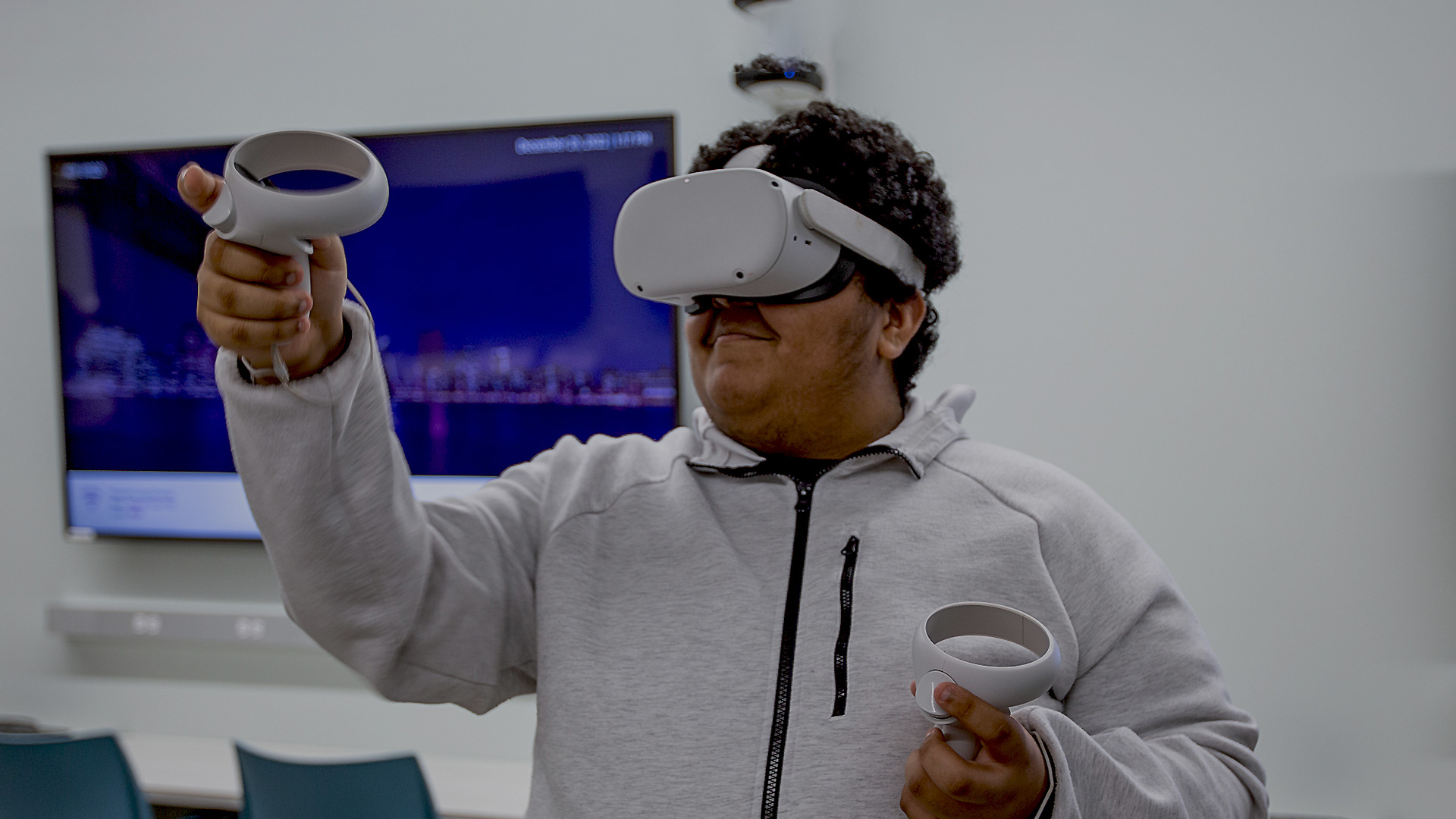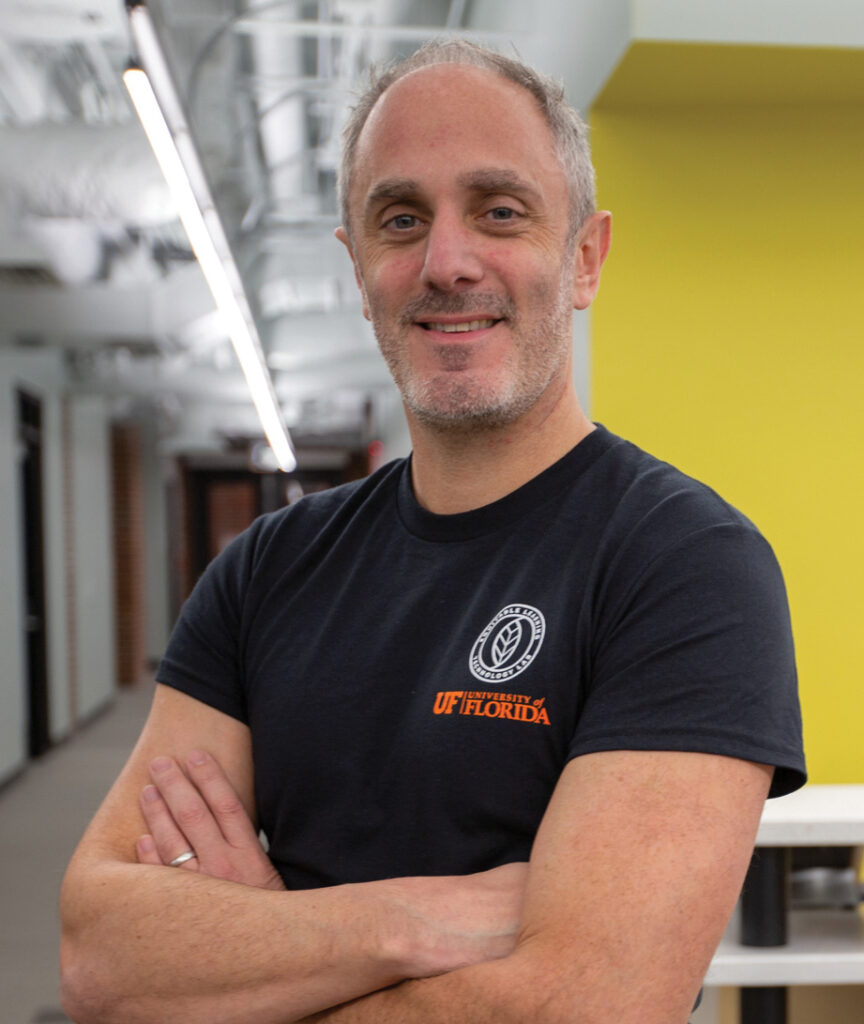In a small private school in Jacksonville, a teenager put on a virtual-reality headset
for the first time. Immersed in another world, he chattered excitedly to his classmates and teachers.
It was the most they’d ever heard him say.
University of Florida researcher Nigel Newbutt had seen this before: immersive technology unlocking potential in autistic people, who often face challenges with communication and social interaction. It was why he’s been visiting the school, Reach Academy, which serves students with autism spectrum disorder (ASD).
With ASD diagnoses on the rise — affecting 1 in 36 children, according to the Centers for Disease Control and Prevention — using technology to better serve young people with autism could have sweeping impacts on education, employment and independent living. To make immersive tech the norm, though, Newbutt knows he needs more than anecdotes. He needs evidence. Through partnerships with the autism community, his Equitable Learning Technology Lab in UF’s College of Education puts people with ASD in control of the research agenda.
“They’re the experts on what they need,” he says. “This is a paradigm change toward the involvement of autistic people.”
Reach Academy Director Stephanie Kaloupek agrees. When Newbutt first emailed her, she almost deleted the message. She’s protective of the kids, and new people in their space can be unsettling. Reading more closely, though, she saw that Newbutt didn’t just want to gather data from them. He wanted the students to call the shots, working alongside his team as co-researchers. And he was bringing technology he believed could change their lives.
“I said, ‘Wait a second, this seems amazing,’” she recalls.
Watching the nonverbal student’s reaction when he put on the VR headset, she knew she’d made the right call.
“All of a sudden, he was speaking full, complete sentences,” she says. “It was big.”
Nothing About Us Without Us
Beanbags land with a thud and laughter fills the playground as the researchers jokingly trash-talk their way through a game of cornhole. Newbutt is the reigning champion at Reach Academy, although he’d never heard of the game before coming to UF from the United Kingdom in 2021 — he sometimes calls it “corndog.”
Months before their research began, Newbutt and doctoral student Marc Francois began making the drive to Jacksonville to bond with the students through informal activities like this.
“They are so smart, but if you really want to see how smart they are, you need to make space for them to feel comfortable and safe,” Francois explains.
At first, the students didn’t talk much. “Then we started to see them interact and share ideas,” Francois says.
The visits continued, culminating in a summer technology camp at the school. For Ethan Anderson, a Reach graduate who now attends the school’s transition program, the experience showed him immersive tech’s potential for “teaching some other autistic children to do their best behaviors and learning to work hard,” he says.
“It challenges us and makes us feel powerful,” Anderson says. “It changed all of our lives, because VR is the golden age of the future.”
In traditional classrooms, expectations are often set too low, Newbutt says.
“Autistic people have this amazing intelligence, but it’s not always brought out. Traditional education doesn’t speak to their strengths,” he says.
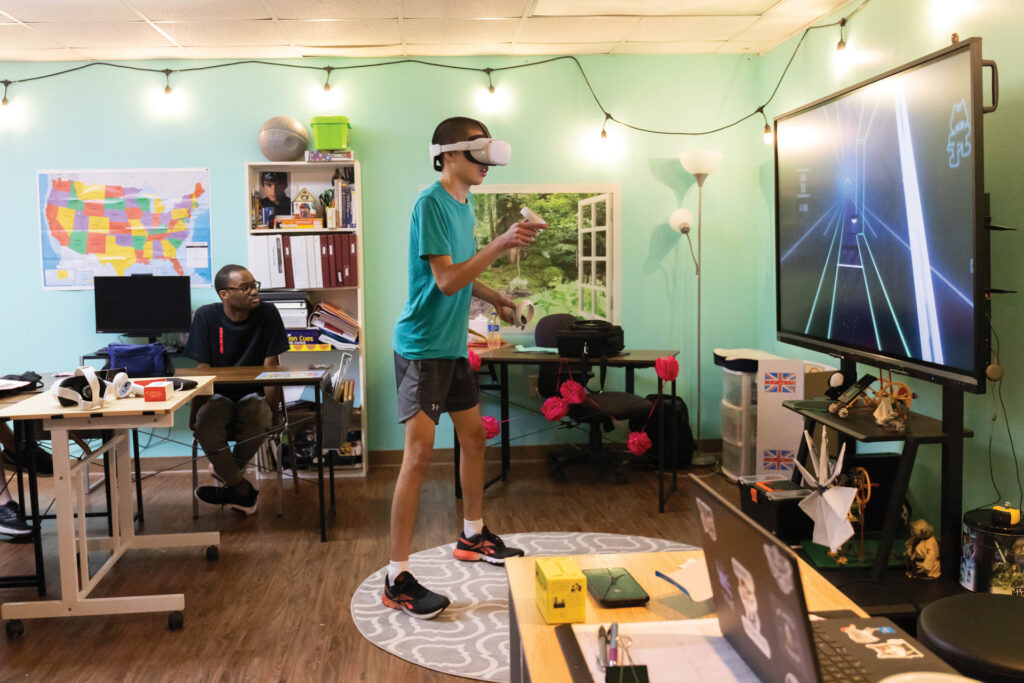
One of those strengths tends to be an affinity for technology. In 2015, when VR headset prices began to drop, researchers envisioned potential for people with ASD (which since 2013 has been the unified diagnosis for what was once separated into autism, Asperger’s and other related disorders). Amid the speculation, Newbutt says, “it occurred to me that nobody had asked them their views on any of this stuff.”
He decided to change that, and started gaining insight on what the community actually wanted, in alignment with a motto often heard in disability advocacy: “Nothing about us without us.” When Newbutt tested potential uses for a social robot, for example, students with autism indicated that they’d rather interact with the robot in the school hallway than in the classroom. What they wanted to use it for wasn’t learning, but managing their emotions, he discovered. As the team’s work at Reach Academy continues, Newbutt expects similar insights on how immersive technology can best be used for ASD. That could take the form of job-training programs, virtual interview practice, or science interactives to spark interest in STEM — all of which Newbutt has taken out of the lab and into the community.
“When we put technology into a space and autistic individuals start modifying it or start talking about it not being quite right, that’s a moment where you think, ‘We’re doing something right here.’”
Creating an Autism-Accessible City
The director’s slate claps to start the scene, and a waitress walks up to a table carrying pizza and salad. She’s delivering the order to a 360-degree camera, which is capturing what a diner would see sitting at the table. When played through a VR headset, the footage will let people with autism practice the unwritten rules of dining out before actually going out.
When Newbutt asked the ASD community what they’d like to address through VR, independent living joined education and employment as top priorities. So alongside their efforts at Reach, the team is building interactive experiences to help navigate the customs of a restaurant meal. When the order comes out wrong, the music is too loud, or the customer needs to get the server’s attention, a list of options will appear so users can decide how to respond, then get feedback on their choice.
“One of the key things we always hear from the autism community is that being able to experience something before going there is absolutely vital,” Newbutt says.
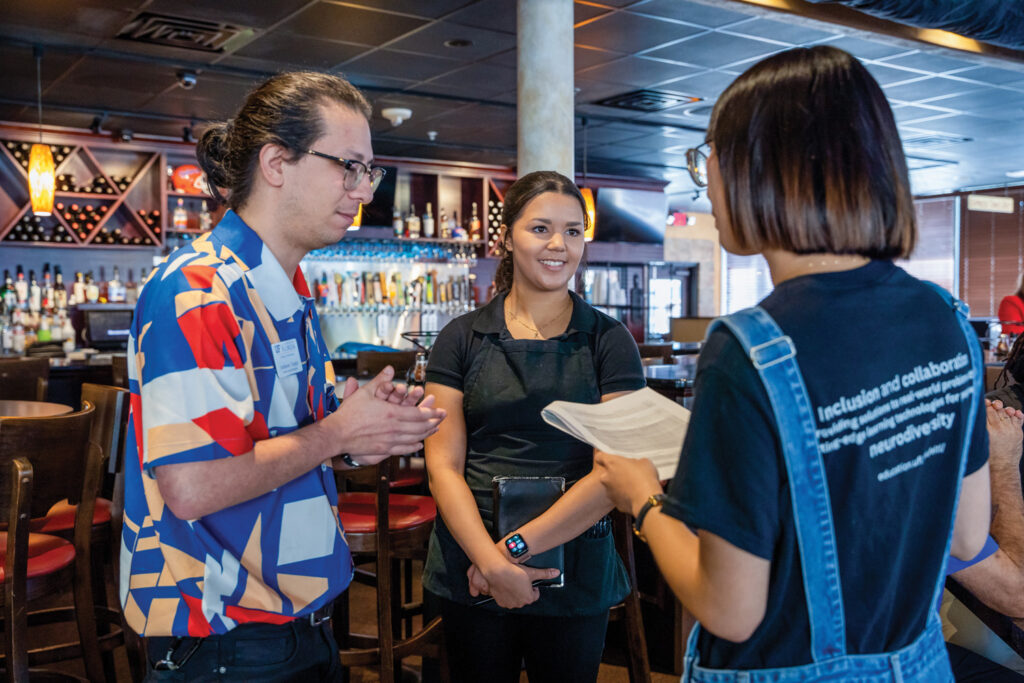
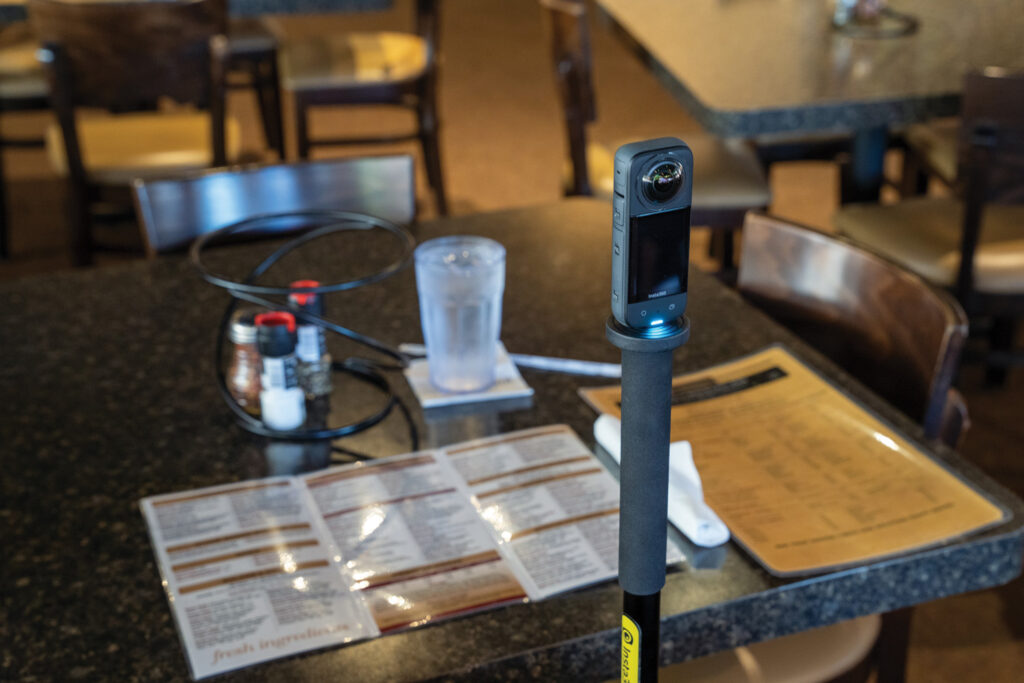
Co-directing today’s filming is Jacob Warshofski, who has autism and works with the Florida-based group Autism Worldwide. Warshofski watches the scene, then offers suggestions for the next take. Once the College’s E-Learning, Technology and Communications team finishes developing the immersive experience, it will be available for free, loaded onto refurbished phones paired with inexpensive VR headsets and shared with autistic people in the community. Then Newbutt’s team will gather data on how the simulation is used, informing the next iteration.
It’s part of Newbutt’s goal for Gainesville to become an autism-accessible city, where 360-degree tours of everything from banks to movie theaters could help people with autism feel more comfortable visiting new places. Next up: Partnering with the Florida Museum of Natural History to expand its offerings for the autism-spectrum community.
“All of this is about providing access. The experience of going to a restaurant or museum with family or friends is part of life, and if you’re not able to do that, it limits the opportunities and ambitions that a young person has,” Newbutt says. “When you’re able to give them the confidence to go somewhere they’ve never been before, that’s so meaningful.”
Strengths Over Deficits
Back at their headquarters in UF’s Norman Hall in mid-December, Newbutt and his team wait. Rows of orange and blue Gatorade bottles line the tables. VR headsets and controllers stand ready on the desks.
After a successful campus visit from the Reach students in November, the lab group is hosting six half-day tech-camps for other young people with ASD to encourage them toward STEM careers and show them that college can be a welcoming place, says lab member Zachary Larson, who has autism. A computer engineering student at the University of Central Florida, Larson led the planning of the camps, which are supported by the Patti Shively Foundation.
“We wanted it to be less formal, not just a lecture or a class,” he says. “They’re having fun, but as they’re having fun they’re inspired to understand STEM.”
Young people and their caregivers from Gainesville and beyond have signed up for the free camps, but the first session’s start time comes and goes. No one shows.
It’s disappointing, but not entirely unexpected, Newbutt says. They know that new people and places can be extraordinarily stressful.
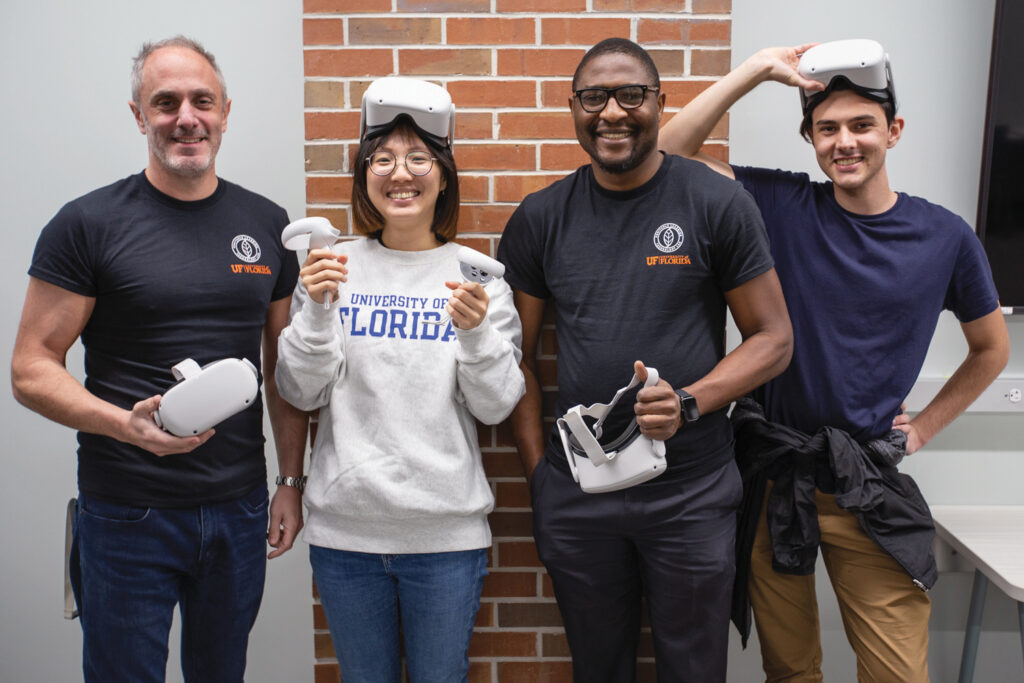
The afternoon session turns out the same.
The team starts a list of lessons learned: Don’t schedule camp during the parents’ workday, or during the holiday break. They’re not too dejected, because they’re learning what works and what doesn’t. But they also feel the urgency to get it right, because the employment outlook for people with ASD is bleak.
The advocacy organization Autism Speaks estimates that two years after finishing high school, more than half of young adults with autism aren’t working or going to college, and about half of 25-year-olds with autism have never been employed. Those who are may be underemployed, working in jobs that don’t tap into their skills, Newbutt says. While people with autism may struggle with “soft skills” like reading facial expressions, they can excel in areas like pattern recognition, which can make them well suited for tech jobs, he says.
Francois was drawn to Newbutt’s vision of a future where immersive technology helps educators and employers better understand and develop the abilities of people with ASD.
“As a researcher, I don’t just want to write papers. I want to change lives,” Francois says. “That’s why I work with Dr. Nigel. He shares the same goal.”
On the second day of tech camp, the tide changes. Students and their families arrive, and they’re delighted. Christian Cartagena, a 13-year-old with a passion for robotics, starts the day by learning programming, animating a character with game-building software.
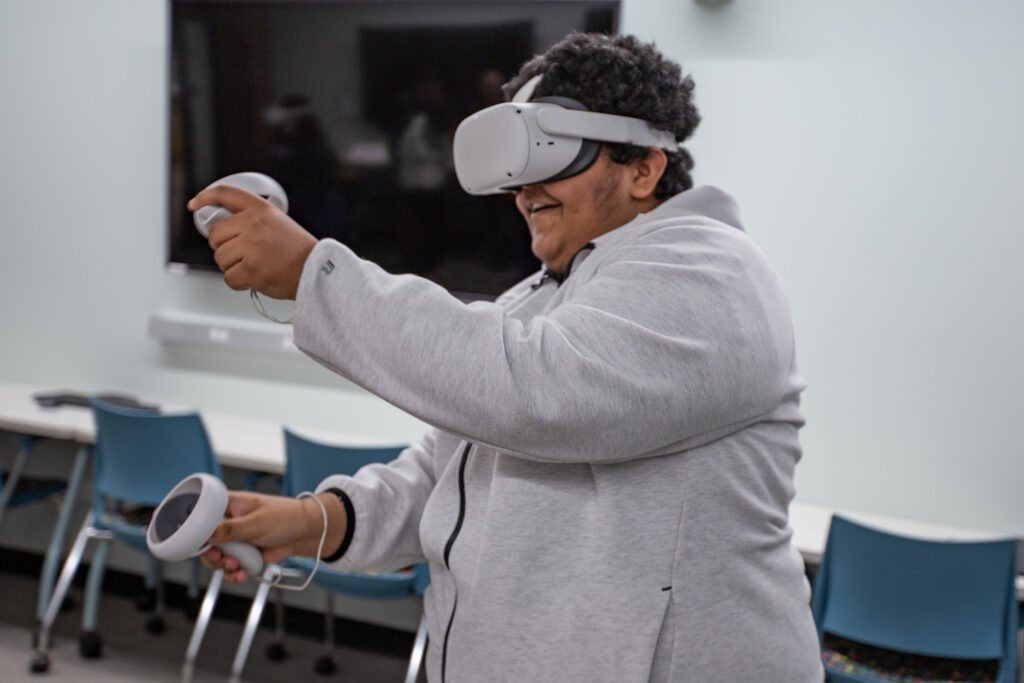
“He’d make a fine computer engineer,” Larson tells Christian’s grandmother, Myrna Carrasco.
“Now that he’s here, he can see that he can do it,” she replies. “It’s just not me telling him. He’s really doing it.”
Christian dons the VR equipment, testing a job simulator and a cooking game. Every few minutes, he takes off the headset and jogs over to hug his grandma.
“I’m very happy. I want to come here as often as we can,” he says.
“I know,” she smiles.
“Abuela,” he says, “this is the best day of my life.”
On the final day of the camp, more students and caregivers arrive — some before the doors even open. For Newbutt, it’s gratifying to see that appealing to their strengths can cultivate their interest in science and technology.
“It’s about giving them that eye-opening moment where they see there’s a place where their strengths are focused upon,” he says. “That makes it all worthwhile.”
Photos courtesy of UF College of Education
Source:
Nigel Newbutt
Assistant Professor of Advanced Learning Technologies
nigel.newbutt@coe.ufl.edu
Hear the Story
The audio version of this story is available on our YouTube.

